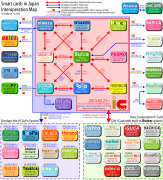SAPICA
 From Wikipedia the free encyclopedia
From Wikipedia the free encyclopedia

SAPICA (サピカ, Sapika) is a rechargeable contactless smart card ticketing system for public transport in Sapporo, Japan. Sapporo City Transportation Bureau (SCTB) introduced the system from January 30, 2009. The name of the card means "Sapporo's IC card". Sa' (サッ) is also the sound symbolic word for quickly pulling a card out and pi' (ピッ) is the equivalent of "beep". The card is issued by Sapporo Information Network Company (札幌総合情報センター株式会社, Sapporo Sōgō Jōhō Sentā Kabushiki Gaisha), the third sector (half public) company of Sapporo City Government.
The integrated service with Kitaca, a smart card system by JR Hokkaidō, was initially considered, but they decided to introduce the different systems because of the technical and financial difficulties. The two operators initially hoped to start an integrated service, [1] but as of February 2020 Sapica still can not be used on JR services.[2]
While SAPICA uses FeliCa NFC technology, just like Suica and Kitaca, SCTB intentionally uses a different system code and encryption key to break compatibility, thus avoiding JR East licensing fees.[3]
From 2001 to 2004, Sapporo Municipal Subway experimented with the rollout of different smart card called S.M.A.P. Card (S.M.A.P.カード, Sumappu Kādo), which was ultimately scrapped.
Usable area
[edit]
As of its introduction on January 30, 2009, the card is usable on Sapporo Municipal Subway Lines, as well as on the Sapporo Streetcar, Hokkaido Chuo Bus, JR Hokkaido Bus and Jotetsu Buses. SAPICA can also be used as a payment card at participating stores and vending machines.[4]
Types of cards
[edit]- Unregistered SAPICA: For adults only.
- Registered SAPICA: For adults and children. A card can be reissued when a user lost it.
- SAPICA commuter's pass: For adults and children, with registrations.
References
[edit]- ^ JR北海道のICカード乗車券「Kitaca」が10月25日にスタート (JR Hokkaidō's IC card ticket "Kitaca" starts on October 25) by BB Watch, October 25, 2008. (in Japanese)
- ^ [https://www.sapica.jp/en/faq/#question08 Sapica official website Q&A (in English)
- ^ "2次元空間 札幌に行ってきた番外編". 2010-02-10. Archived from the original on 2015-09-07. Retrieved 2012-06-06.
- ^ "SAPICAの特長". Sapica. Sapporo Information Network Co. Retrieved 8 December 2018.
External links
[edit]- (in English) Official website
- (in Japanese) Official website
- (in Japanese) Sapporo Information Network Company